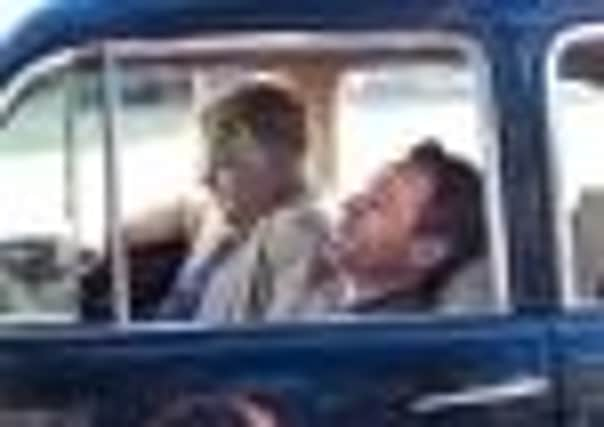Film review: The Master (15)


PAUL Thomas Anderson is not a man you should send out for your messages; chances are, instead of milk, eggs and the papers, he’d bring back anchovies and a hat stand. Films like There Will Be Blood and Boogie Nights have never delivered quite what you’d expected; they may start off in an oil field or on a porn set, but they quickly head off into unpredictable, perplexing places.
Anderson’s first film in five years, The Master, is another sweeping perambulation, a boldly ambitious piece of filmmaking that is brilliantly acted, weirdly compelling and chewier than octopus jerky. The opening 20 minutes focus on a Second World War veteran (Joaquin Phoenix), so sex-obsessed that he manages to make out with a woman that his shipmates have built from sand. Freddie is also an alcoholic, whose cocktails include a secret kick that might be torpedo fuel or paint thinner. Unsurprisingly, one of his homemade moonshine brews kills a co-worker, sending him on the run.
Advertisement
Hide AdEventually he stows away on a fancy yacht whose passengers are all followers of The Cause, an embryonic philosophy created by the charismatic Lancaster Dodd (Philip Seymour Hoffman). The cult bullet points include a belief in past lives, and that with proper processing, people can be purged of negative impulses through an elaborate combination of group sessions, personality interrogations and retreats.
Sound familiar? Dodd is certainly a bit like L Ron Hubbard, with his Sea Org travels, the 1940s setting, his New Age pronouncements and prolific writing. Yet The Master is not an excoriation of Scientology. If anything, it gets off lightly. Dodd is clearly making it up as he goes along, so there’s not much need for an exposé. Instead The Master is a baggy character study which dips into Hubbard’s back story when necessary, but shies away from more loaded parallels.
Its main interest is the relationship between Dodd and his feral stowaway, showcased in one standout scene in which Freddie has his buttons pushed regarding crimes and insecurities. Anderson is always intrigued by dysfunctional father-son relationships – look at Paul Dano and Daniel Day-Lewis feuding in There Will Be Blood, or Burt Reynolds’ porn producer mining a prodigiously gifted Mark Wahlberg in Boogie Nights – and there’s an element of exploitation here too. Dodd may be rooting out Freddie’s underlying trauma, but he is also testing out his conversion techniques on a troubled, suggestible man. Meanwhile Dodd’s Lady Macbeth of a wife (Amy Adams) is fretting about Freddie’s unhealthy influence on her husband, which may supersede her own – the film makes graphically clear that she is accustomed to having Dodd in the palm of her hand.
Unfortunately, the events unfold at the pace of molasses dropping from a spoon. And some of it is wilfully puzzling. There’s a sequence involving a roomful of naked women that seems to be a fantasy, but it’s hard to place who it belongs to – Freddie, Dodd or Mrs Dodd. It’s hard to shake a feeling that this is incoherence posing as depth; it’s an indulgent movie buff’s playpen which coasts on an unnerving, unbalanced mood of deliberately chilly vagueness. It’s certainly too long and pretty repetitive – There Will Be Boredom – and the loose, open ending doesn’t feel like great storytelling, more like a test of willpower for Anderson’s faithful film disciples.
Director: Paul Thomas Anderson
Running time: 143 minutes
Rating: * * * *
On general release from Friday